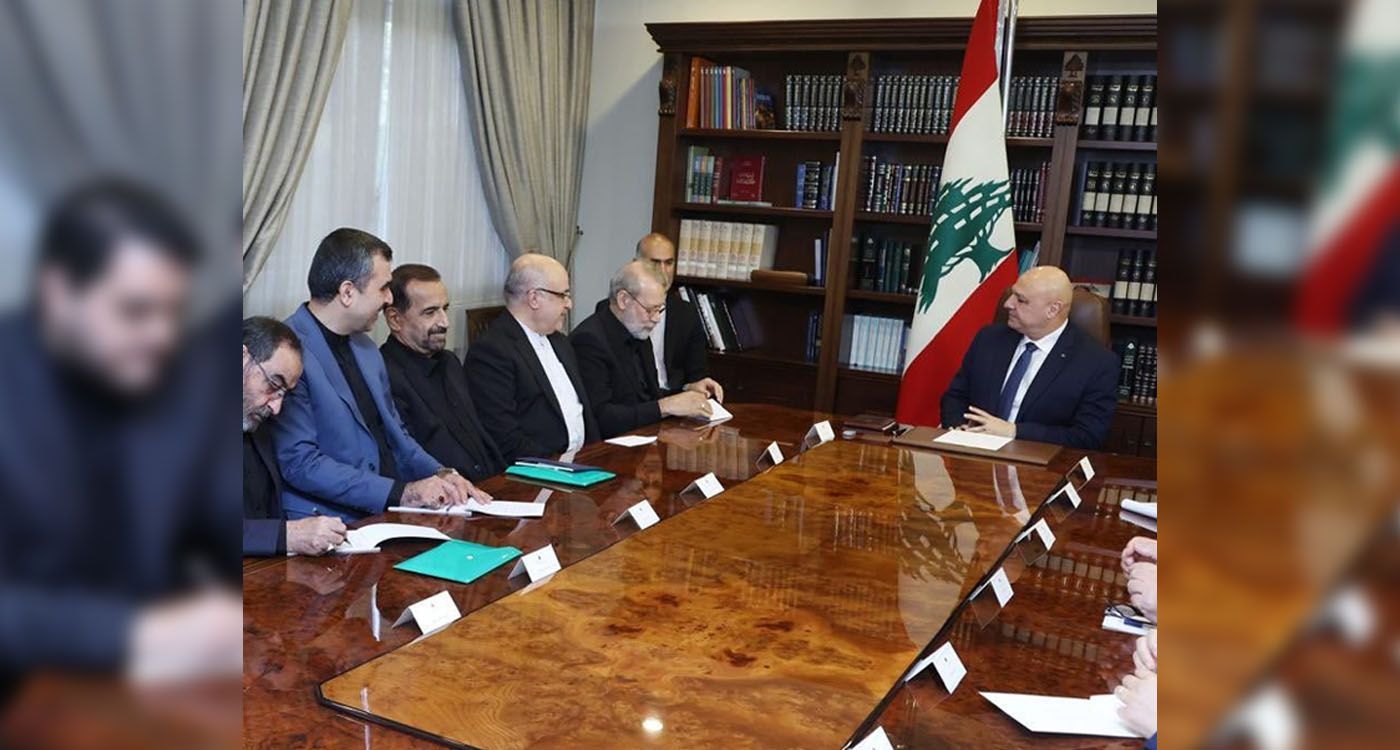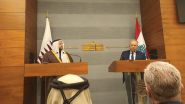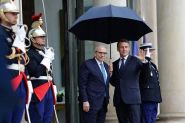
The Lebanese government’s message to Tehran was crystal clear on Wednesday: Beirut will not tolerate any interference in its internal affairs, let alone intrusions into its sovereign decisions, most notably, the state’s monopoly on arms.
This unequivocal stance was delivered first by President Joseph Aoun and then by Prime Minister Nawaf Salam during their meeting with Iran’s Supreme National Security Council Secretary, Ali Larijani.
But whether Iran, long accustomed to wielding influence in the Lebanon via its military arm, Hezbollah, will heed that message remains uncertain.
The ambiguity stems from Larijani’s double speech in Beirut. When confronted by the firm positions of President Aoun and Prime Minister Salam, who left Tehran’s envoys in no doubt of Lebanon’s sovereignty, he claimed that Iran does not meddle in Lebanese internal affairs. Yet, addressing Hezbollah supporters gathered at the tomb of their former leader, Hassan Nasrallah, he urged them to maintain the resistance. Meanwhile, the Jaafari mufti Ahmad Kabalan, an unofficial Hezbollah spokesman, launched a blistering attack on the government, vowing to “bring down the capitulating government clique.”
The comments from Aoun and Salam have only deepened the fury of a movement whose maneuvering space continues to shrink against a government resolute in ending the heresy of a “state within a state” that Hezbollah has imposed on Lebanon for years.
President Joseph Aoun rejected during his meeting Wednesday with Ali Larijani any foreign interference in Lebanon’s domestic affairs, stressing Lebanon’s readiness to cooperate with Iran, provided such relations remain anchored in national sovereignty and mutual respect.
In a firm message to the Iranian leadership, Aoun stressed that “no party is permitted to bear arms outside state authority.”
He warned against the dangers of armed groups seeking backing from abroad to challenge fellow Lebanese, saying “the Lebanese have paid a high price for relying on external powers against one another.”
Aoun also criticized recent statements by some Iranian officials opposing Hezbollah disarmament as “not helpful” and stressed that Lebanon, which respects the sovereignty of other countries, including Iran, expects the same in return.
He underscored that the friendship between Beirut and Tehran must transcend sectarian boundaries, embracing all components of Lebanese society — Christians and Muslims alike.
Aoun emphasized, as well, that the Lebanese state, through its constitutional and security institutions, bears full responsibility for protecting all its citizens.
Addressing regional threats, the president noted that any challenge posed by Israel or other actors is a challenge to all Lebanese, and that national unity remains the most powerful defense.
For his part, Larijani praised Aoun’s role in fostering unity across Lebanon’s sects and communities, and reiterated Tehran’s stance of non-interference in Lebanese internal affairs.
Larijani affirmed Iran’s desire to deepen ties with both the Lebanese state and people, assuring that any cooperation would be guided by respect for Lebanon’s sovereignty and by mutual interest.
“Iran does not wish for even the slightest disruption in its friendship with Lebanon,” he said, adding that Tehran stands ready to help if requested by the Lebanese government.
The Iranian official expressed Iran’s willingness to assist Lebanon in reconstruction efforts and renewed an invitation for Aoun to visit Tehran.
From Ain al-Tineh, Larijani urges “unity in Lebanon”
After his meeting with President Aoun, Larijani then moved on to a meeting with Parliament Speaker Nabih Berri in Ain al-Tineh.
From there, the Iranian official reiterated that Tehran does not interfere in Lebanon’s internal affairs, then proceeded to outline how the country should address its political, military, and reconstruction challenges.
Larijani stressed the crucial importance of Lebanon’s unity and success, while reaffirming the friendly cooperation between Iran and Lebanon “without insisting on directives that impose a specific timetable,” in reference to the U.S. roadmap presented to the Lebanese authorities.
He added that wise decision-making in Lebanon requires “friendly and inclusive dialogue,” and praised the “Resistance” for demonstrating “deep thinking and strategic vision.”
Mr. Larijani also rejected any foreign interference, stating that “countries should not issue orders to Lebanon from abroad” and asserting that Iran does not meddle in Lebanon’s internal affairs and respects the country’s decisions.
On the military front, he affirmed that “if the Lebanese government requests it, we will, of course, be ready” to act in the event of an Israeli escalation, while stressing the importance of preserving and valuing the “Resistance,” which, he said, confronts Israel, describing it as a “predator.”
Regarding reconstruction, he said Iran “will make every possible effort” and noted that assistance has already been provided.
Lebanese red lines
At the Grand Serail, where Ali Larijani was received at 6 pm, the delegation encountered the same message delivered in Baabda: Iranian interference in Lebanese affairs will not be tolerated.
Local media reports suggest that Prime Minister Nawaf Salam offered a distinctly cool reception to the senior Iranian official and his accompanying delegation.
Addressing his guests, Mr. Salam stated that recent remarks from certain Iranian officials, namely Foreign Minister Abbas Araghchi, Supreme Leader Ayatollah Khamenei’s adviser Ali Akbar Velayati, and General Iraj Masjedi, the deputy commander of the Quds Force for Iranian coordination, are “unacceptable both in form and substance.”
He declared that their comments, actively condemning decisions taken by Lebanon’s constitutional authorities and laced with barely veiled threats, represent a flagrant breach of diplomatic norms and a violation of the principle of mutual sovereignty. Mr. Salam stressed that such respect is “a foundational pillar of any healthy bilateral relationship and a fundamental tenet of international law, which cannot be circumvented.”
He added: “No Lebanese official would dream of meddling in Iran’s internal affairs, supporting one faction over another, or opposing Iran’s sovereign decisions.” Consequently, “Lebanon will under no circumstances tolerate interference in its domestic affairs,” and expects Iran to observe these rules with clarity and unequivocal respect.
Mr. Salam also underlined that “decisions taken by the government must not be subject to debate in third countries.” He emphasized: “The Council of Ministers is the sole center of decision-making in Lebanon. It is the Lebanese alone who determine their fate, rejecting both guardianship and diktat.” On the matter of arms, he affirmed it is a matter of Lebanese sovereignty, referencing both the Taif Agreement and affirmations contained in President Aoun’s inaugural address and the ministerial declaration.
The Prime Minister made it clear that Lebanon “one of the earliest defenders of the Palestinian cause, having paid a heavy price in its confrontation with Israel”, needs no lessons from anyone. Beirut is determined to end Israel’s presence in the five points it occupies in the south “by all political, diplomatic, and legal means available.”
He further insisted that “all relations with Lebanon must be conducted through its constitutional institutions, not via any political party or parallel channel,” and noted that foreign assistance is welcome, “provided it is channelled through official routes.”
While affirming that “Lebanon values its historic ties with Iran and all friendly nations, based on mutual respect,” he reiterated that “national unity, the sovereignty of the state, and government decisions remain red lines that cannot be crossed.”
“Commitment to the resistance”
In the evening, Ali Larijani, having paid his respects at Hassan Nasrallah’s tomb, effectively exhorted Hezbollah supporters gathered around him to reaffirm their commitment to the resistance. He declared that “the hatred directed at you is proof of your influence and fortitude… We will always stand by your side. We do not interfere in the domestic affairs of other nations, but we remain steadfast in our support for resistance movements across the globe.” He went on to urge: “If you intend to follow Nasrallah’s path, your duty is to stay strong and persevere in resistance. Your path is clear, and in the end, you shall be the victors.”
Meanwhile, Mufti Ahmad Kabalan released a militant statement condemning “the expansionist designs of Benjamin Netanyahu” and accusing the Lebanese authorities of “submitting to Israeli diktats.” He declared that “the Lebanese government and its executive authority find themselves shackled in imposed silence, trapped in a sovereignty paralysis and a national scandal.”
He accused the now-defunct government of showing resolve only against its own people,and asserted that “facing Zionist tyranny, there is no other recourse but sovereign resistance and the toppling of the capitulating government clique.”



Comments